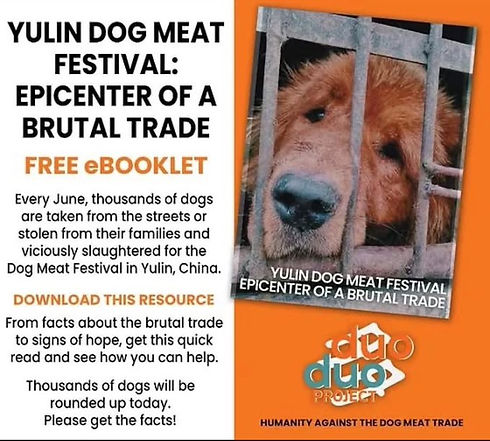THE DOG & CAT MEAT TRADE IN
CHINA



Eating dogs is not illegal in China. It’s estimated that more than 10 million dogs and about 4 million cats are killed for human consumption every year in China.
In some regions, you can easily find it for sale at street markets, but also in restaurants. The cost of dog meat is around $4/lb, a price on average that’s higher than the meat of other animals, while cat meat is less expensive.
A significant portion of the dog and cat meat trade in China is linked to criminal activity, while many animals are stolen pets and strays taken from backyards and streets. The journey to slaughterhouses entails cramming these animals into wire cages and transporting them for hours or days, with many suffering from dehydration, injuries, suffocation and heatstroke, and some dying before arrival.
Inside animal markets/wet markets dogs and cats are sold to the highest bidder and are slaughtered directly on the spot. These animals come from illegal farms or are kidnapped from their families and imprisoned for days in deplorable conditions, without water or food. These sensitive animals are then killed in front of each other in the most brutal ways.


Send suggestions to China's Food Safety Office! Cats and dogs are not food!
THE YULIN DOG MEAT FESTIVAL
The Yulin “Lychee and Dog Meat” festival is an annual 10 day event where over 10,000 dogs are eaten. Cat meat, fresh lychees and liquor are also available at the festival.
The event in this remote part of southern China has proved to be very controversial in recent years, particularly in the wake of the coronavirus pandemic.
It takes place in Yulin, a city in the Guangxi province of China, and runs from the 21 to 30 June during one of the hottest weeks of the year.
The first festival took place in 2009 to mark the summer solstice. Dog eating is traditional in China, and according to folklore eating the meat during the summer months brings luck and good health. Some also believe dog meat can ward off diseases and heighten men’s sexual performance.
The festival has attracted widespread negative coverage within China and internationally. Activists have reported that animals are slaughtered inhumanely using clubs in public and that hygiene practices at the festival do not fall in line with Chinese regulations. There are also complaints that dogs are brought to Yulin from across China in cramped conditions, and festival visitors have reported seeing some animals with collars, indicating they are stolen pets.
The World Health Organisation has warned that the dog trade spreads rabies and increases the risk of cholera.
A 2017 survey revealed that in Yulin, nearly three-quarters of people don’t regularly eat dog meat despite efforts by traders to promote it. A 2016 nationwide survey found that 64 per cent of Chinese citizens wanted the Yulin festival shut down and 69.5 per cent have never eaten dog meat.

.jpg)

ACTIONS YULIN 2025



ORGANIZATIONS

PAWS OF CHINA - PLUSH BEARS
Based in Northern China. They provide them with much-needed love, veterinary care, and sanctuary. Most of beautiful residents are dogs rescued from slaughterhouses, meat markets, and local dog butchery yards. They also rescue dogs & cats from the notorious Yulin Dog Meat Festival.






















![FB_IMG_1566676239438[1].jpg](https://static.wixstatic.com/media/d8758b_fea118d376dd4b3ca621b62215143658~mv2.jpg/v1/fill/w_58,h_58,al_c,q_80,usm_0.66_1.00_0.01,enc_avif,quality_auto/FB_IMG_1566676239438%5B1%5D.jpg)